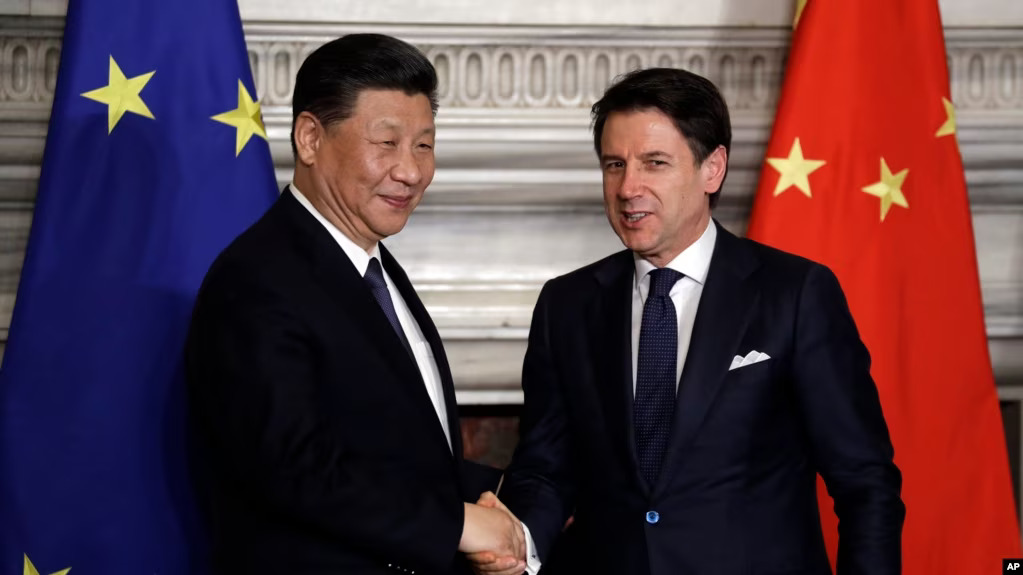ROME: Italy is having second thoughts on renewing a controversial investment pact with China.
The Belt and Road Initiative (BRI) deal was on the table during May 5 talks in Rome between Chinese Foreign Ministry official Wang Lutong and his Italian counterparts, according to the Italian news outlet Decode39.
It was also under discussion when Chinese Foreign Minister Wang Yi visited Italy in February this year.
A senior Italian government official has told Reuters that his country is highly unlikely to renew the agreement when it expires early next year, but that it needs time for further discussions with Beijing.
The deal was sealed in a five-year memorandum of understanding signed during Chinese President Xi Jinping’s visit to Rome in March 2019, making Italy the only country in the Group of Seven advanced economies to participate in China’s global infrastructure program.
But it has so far failed to produce the hoped-for economic returns, Italian officials told Reuters.
Italian politics also are a factor. Prime Minister Giorgia Meloni criticized the deal, which was negotiated by her predecessor before she came to power last September.
In an interview with Reuters last year, Meloni said, “There is no political will on my part to favor Chinese expansion into Italy or Europe.”
Former Prime Minister Giuseppe Conte had hoped the agreement would boost the Italian economy and increase exports to China.
But the deal aroused the concern of allies such as the United States despite Italy’s insistence that it was purely commercial.
Since the BRI memorandum was signed in 2019, the two countries have made progress in energy manufacturing and joint investment between Italian sovereign funds and Chinese funds, but less so on infrastructure, which is more sensitive for Italy’s NATO allies and the U.S.
Two ports
A key element of the agreement calls for the development of the Italian ports of Genoa and Trieste.
These are the busiest ports in Italy, and Trieste is strategically located at the north end of the Adriatic Sea with overland links to Central and Eastern Europe.
Italian Minister of Enterprise and Manufacturing Adolfo Urso recently said the port of Trieste would not fall into Chinese hands, arguing it has become more important than ever since the Russian invasion of Ukraine.
“We must understand that rebuilding Ukraine is the engine of European economic revival, just like the Marshall Plan after World War II,” he said.
China has said little publicly about Italy’s hesitation. Jia Guide, the Chinese ambassador to Italy, acknowledged in an April 26 interview with the Italian news outlet Sole 24 Hours that the memorandum of understanding is not a legally binding treaty.
“It embodies the political will of the two sides to strengthen practical cooperation in various fields. Adhering to win-win cooperation is the unchanging mainstream between China and Italy, and it truly conforms to the fundamental and long-term interests of the two peoples,” he said.
China’s Ministry of Foreign Affairs has cited “fruitful outcomes” since the signing of the agreement and said there is “a need for both sides to further tap into the potential of our Belt and Road cooperation.”
Nicola Casarini, a senior research fellow at the Wilson Center, told VOA Mandarin that a renewal of the agreement would lead to more Chinese investment in Italy and provide Italian companies with better market access in China. A decision not to renew, he said, would be seen by Beijing as an unfriendly signal but would likely not prompt retaliatory measures.
“Since China is trying to mend ties with Europe as a whole, I think it is pretty unlikely that the Chinese government will single out Italy in terms of commercial reprisals, as it did in the case of Lithuania,” he said.
“Why? Because that will elicit a backlash from the rest of the European partners of Italy. In that case, China-Europe relations will worsen.” He said China was more likely to adopt “more sophisticated” measures such as diverting trade away from Italy toward other European partners such as France and Germany.
The deal has failed to boost Italy’s underperforming economy in the past four years as expected.
Italian exports to China totaled $18.1 billion (16.4 billion euros) last year compared with $14.2 billion (13 billion euros) in 2019. Chinese exports to Italy rose to $62.8 billion (57.5 billion euros) from $34.6 billion (31.7 billion euros) over the same period, according to Reuters.
Taiwan Strait
Meloni, meanwhile, has been more outspoken about the Taiwan Strait issue than her predecessor.
In an interview with Taiwan’s Central News Agency before being elected, she said she would strengthen cooperation with Taiwan, a move likely to anger Beijing.
Taiwan’s Ministry of Foreign Affairs is preparing to establish a representative office in Milan, which would be its second official agency in Italy and essentially function as a consulate.
Italy, meanwhile, sent a delegation to Taiwan to discuss cooperation in semiconductors at the end of last month but postponed a visit to Taiwan by a delegation of Italian politicians, also scheduled for April. Chinese officials have yet to react sharply to Italy’s warming partnership with Taiwan.
(VOA)









Comment